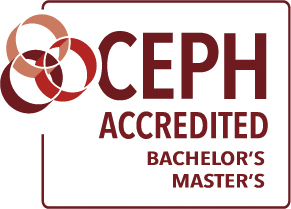Arcadia University’s Department of Public Health, including the MPH and BSPH programming, are accredited by the Council on Education for Public Health (CEPH). Accreditation ensures you are receiving a standardized, high quality education. MPH students are eligible to sit for the National Credentialing Exam in Public Health (CPH) as well as the National Certification for Health Education Specialists (CHES) exam.

CEPH Competencies
Foundational MPH Competencies (as prescribed by CEPH)
Evidence-based Approaches to Public Health
- Apply epidemiological methods to the breadth of settings and situations in public health practice
- Select quantitative and qualitative data collection methods appropriate for a given public health context
- Analyze quantitative and qualitative data using biostatistics, informatics, computer-based programming and software, as appropriate
- Interpret results of data analysis for public health research, policy or practice
Public Health and Health Care Systems
- Compare the organization, structure and function of health care, public health and regulatory systems across national and international settings
- Discuss the means by which structural bias, social inequities and racism undermine health and create challenges to achieving health equity at organizational, community and societal levels
Planning and Management to Promote Health
- Assess population needs, assets and capacities that affect communities’ health
- Apply awareness of cultural values and practices to the design or implementation of public health policies or programs
- Design a population-based policy, program, project or intervention
- Explain basic principles and tools of budget and resource management
- Select methods to evaluate public health programs
Policy in Public Health
- Discuss multiple dimensions of the policy-making process, including the roles of ethics and evidence
- Propose strategies to identify stakeholders and build coalitions and partnerships for influencing public health outcomes
- Advocate for political, social or economic policies and programs that will improve health in diverse populations
- Evaluate policies for their impact on public health and health equity
Leadership
- Apply principles of leadership, governance and management, which include creating a vision, empowering others, fostering collaboration and guiding decision making
- Apply negotiation and mediation skills to address organizational or community challenges
Communication
- Select communication strategies for different audiences and sectors
- Communicate audience-appropriate public health content, both in writing and through oral presentation
- Describe the importance of cultural competence in communicating public health content
Interprofessional Practice
- Perform effectively on interprofessional teams
Systems Thinking
- Apply systems thinking tools to a public health issue
AU Department of Public Health Competencies
Community Health Concentration MPH Competencies
- Use input from stakeholders and other evidence-based sources to evaluate community health programs, policies, and interventions
- Develop a mission statement for a public health organization and develop strategies to meet mission-related goals
- Develop and implement a systematic approach to review research on a selected community health issue to inform novel research question development
- Analyze theoretically based interventions on a selected health behavior
- Apply the Public Health Code of Ethics to a current or historical ethical dilemma in the field
Community Health Concentration Competencies
Program Planning and Policy Development Skills
- Uses a global perspective to critique public health programs, research, policies, and health care systems.
- Contributes to collaborative program planning and evaluation processes, including implementing, monitoring, and evaluating public health programs.
Cultural Competency Skills
- Describes cultural and linguistic characteristics and literacy levels of populations to be served.
Community Dimensions of Practice Skills
- Systematically maps stakeholders who constitute the community linkages and relationships essential to involve in public health initiatives.
- Identifies community assets including governmental and non-governmental resources in the delivery of public health services.
Leadership and Management Skills
- Prepares a programmatic budget.
- Describes the organizational structure and policies of a public health agency.
- Adheres to an organization’s policies and procedures.
- Identifies strategies to address the public health needs of a defined population.


